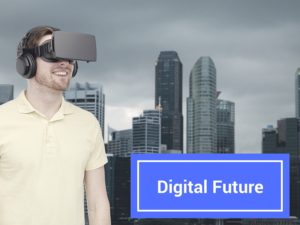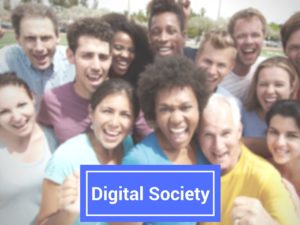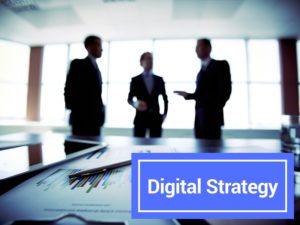I have a passion for reading—an avid exploration of books, articles, blogs, scientific texts, and whitepapers across diverse subjects. Commuting to client sites by train and metro offers ample reading opportunities, aided by tools like Feedly, Pocket, Raindrop.io, and Onenote to collect, organize, and archive intriguing content. My objective is to curate and share this wealth of information, including articles, blogs, videos, and podcasts, often accompanied by a brief summary and reasons for sharing.

Going digital
Going digital has been an evolving journey. As a consultant in digital transformation and IT governance, I’ve moved away from the notion of purely ICT-focused work. My focus now revolves around the organizational aspect of technology, transforming IT departments to generate business value while considering the human factor across the Business-IT spectrum. Embracing the concept of digital organization, I have gone digital all the way.
Digital Future
In the exploration of our digital future I will delve into the transformative impact of three key systems: Augmentation, Robotics, and digital platforms. The concept of augmentation is about technology’s role in enhancing human abilities. In a project for a new clinic I was involved in the challenge to enable a surgeon in Australia to be able to operate online in the Netherlands. This is an example of facilitating surgical procedures across continents. Robotics, on the other hand, signifies the autonomy of technology, wherein machines proficiently undertake tasks previously executed by humans. The Digital Future shows the significance of technological advancements, particularly in machine learning and artificial intelligence, that fuel the emergence of valuable digital platforms reshaping organizational landscapes. Emphasizing the complexity of predicting the future, the chapter advocates leveraging the understanding of potential possibilities to inform present decisions and actions, steering towards a future poised with innovation and adaptation

Digital Organization
In an increasingly digital future, organizations, whether commercial or non-profit, are compelled to adapt to seize available opportunities. Information systems encompass a breadth of tasks challenging for humans, from handling vast data sets to maintaining round-the-clock availability. The integration of computers and IT devices not only unlocks new prospects for workers but also reshapes the fabric of organizational design and internal structure. This shift in organizational dynamics extends beyond internal operations to encompass their positioning within broader business ecosystems. Amidst this transformation, there’s a recognition that technology isn’t always the panacea; at times, IT can introduce more problems than solutions. Understanding the anticipated impact of technology and its value delivery stands central, a task primarily shouldered by the Chief Digital Officer. Equally critical is the adept translation of business needs into pertinent tasks, facilitated by the Service Broker, responsible for effectively sourcing resources within and outside the organizational framework. This also underscores the significance of service management in realizing, delivering, and maintaining digital resources in this evolving landscape.

Digital Society
In the recent past, the influence of computers and IT systems was primarily observed within the sphere of work. However, today’s digital landscape permeates every facet of our lives. It’s evident in everyday actions: reading news, planning travel, sharing health information with healthcare providers, enjoying live performances, and more. The ubiquitous nature of the digital realm signifies a transformative force that presents both opportunities and risks. One poignant illustration lies in the evolution of our cities towards ‘smart’ urban centers propelled by technology. This shift prompts critical reflection—are smart cities an unequivocal boon? It raises a compelling argument favoring the prioritization of ‘smart citizens’ over the emphasis solely on ‘smart cities.’ For me, the essence of a digital society lies not merely in technological advancements but in conscientiously navigating its repercussions from moral and ethical standpoints. Looking into the Digital Society make me delve into the multifaceted impact of digital systems, particularly Artificial Intelligence and Robotics, on societal structures. It scrutinizes systemic biases and ethical considerations intertwined with the profound changes expected in the realms of work, employment, healthcare, education, urban development, and the environment.

Digital Strategy
The impending digital future necessitates a corresponding evolution within organizations, transitioning from their traditional analog roots entrenched in historical industrial frameworks. While not every entity might fully embrace a wholly digital form, the notion of digital transformation weighs heavily on the agenda of many companies. It’s evident that the landscape demands a recalibration towards digital strategies that align with contemporary innovations and technological advancements. For me, crafting a digital strategy involves an exploration to discern the many pathways for integrating innovations and digital technologies within an organization’s framework. Defining a Digital Strategy needs to delve into critical pillars essential for navigating this transformative journey. Transformational Leadership stands as the vanguard, spearheading organizational metamorphosis in sync with digital paradigms. Sourcing of Digital Solutions emerges as a pivotal facet, orchestrating the identification and acquisition of cutting-edge digital tools. Strategy Execution, a cornerstone, delineates the roadmap for successful digital transformations. Finally, the duality of Improving from a business perspective and Optimizing from an IT standpoint converge to elevate operational efficiency and efficacy within the realm of digital strategies. Together, these subheadings form the tapestry guiding organizations towards effectively harnessing the potential of digital technologies

